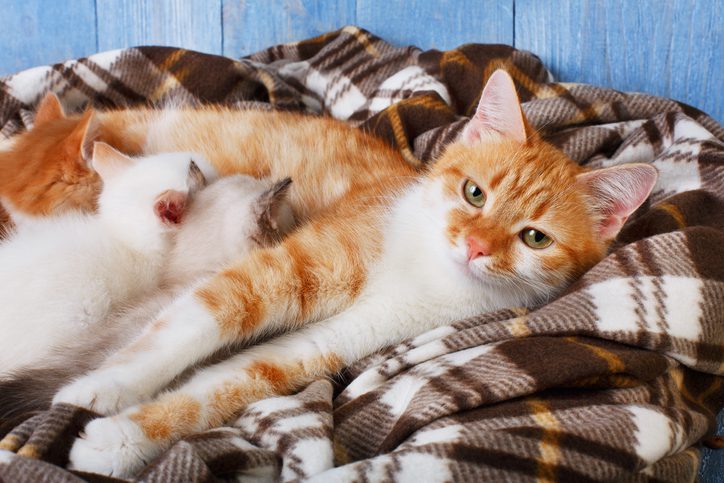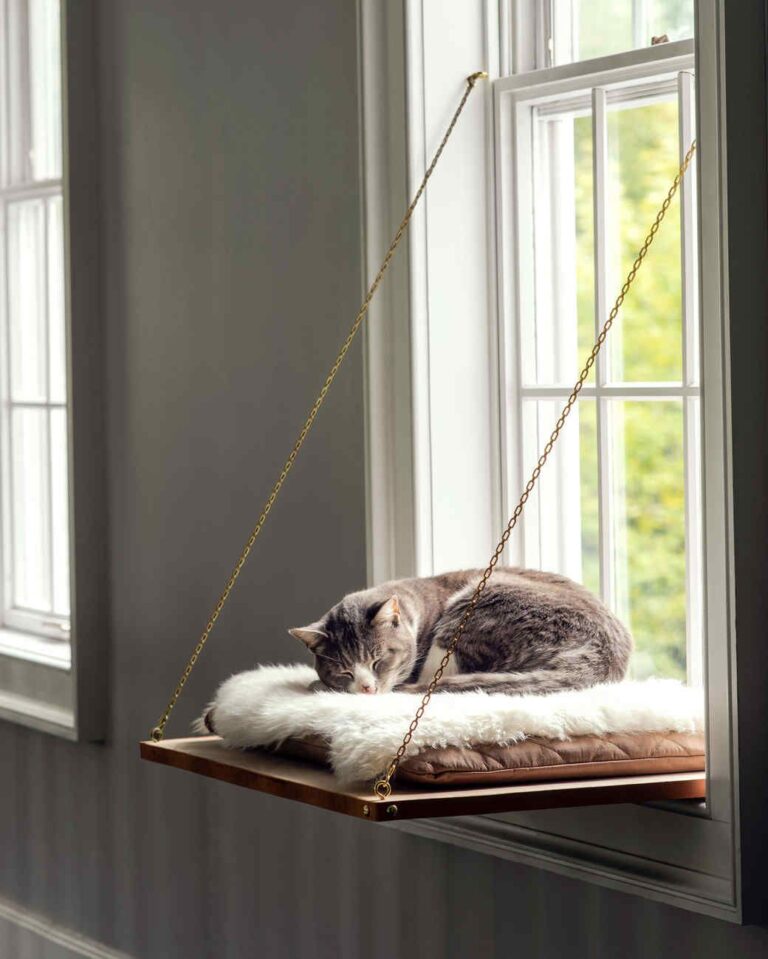How Long Are Cats Pregnant
Hey there! Curious about the fascinating world of feline pregnancy? Wondering how long those adorable little kittens spend growing inside their mommas? Well, get ready to have all your questions answered! In this article, we’ll explore the gestation period of cats and uncover intriguing facts about this incredible journey from conception to birth. So, buckle up and let’s embark on this exciting adventure into the world of cat pregnancies!
Understanding Cat Pregnancy
Cat pregnancy is an exciting time that requires careful attention and understanding. Just like humans, cats also go through a series of physical and behavioral changes during pregnancy. By learning about the signs of cat pregnancy and when to seek veterinary care, you can provide the best care for your furry friend during this special time.
Physical and Behavioral Signs of Cat Pregnancy
As a cat owner, it’s crucial to be aware of the physical and behavioral signs that indicate your cat is pregnant. One of the most noticeable signs is a swollen abdomen, which becomes more prominent as the pregnancy progresses. Additionally, you may notice changes in your cat’s nipples, which may become larger and more pinkish in color.
Behavioral changes are also common during cat pregnancy. Your cat may become more affectionate or seek solitude, depending on her personality. Some cats may experience a decrease in appetite, while others may exhibit an increase in appetite. Paying close attention to your cat’s habits can help you identify these changes and provide appropriate care.
When to Take Your Cat to the Vet
It’s vital to schedule a visit with your veterinarian once you suspect your cat is pregnant. The veterinarian will be able to confirm the pregnancy using ultrasound or other diagnostic tools. This initial visit is essential for your cat’s health and the health of her unborn kittens.
Regular check-ups throughout the pregnancy are crucial to monitor the mother’s wellbeing and the development of the kittens. Your vet will be able to provide guidance on nutrition, address any concerns, and prepare you for the birthing process. If at any point during the pregnancy you notice worrisome signs or have doubts, do not hesitate to reach out to your veterinarian for advice.
The Duration of a Typical Cat Pregnancy
Cat pregnancy differs from human pregnancy in terms of duration. On average, a cat’s pregnancy lasts approximately 63 to 67 days. This timeframe can vary depending on several factors.
Cat Pregnancy Timeline
Understanding the timeline of a cat’s pregnancy can help you prepare for each stage. The initial stage includes fertilization and early development, which typically lasts about 15 to 20 days. During this time, the embryos develop and begin to travel to the uterus.
The second stage, which is embryo development, extends from approximately 21 to 35 days. This stage is crucial as the kittens’ organs and features start to form. It is during this stage that you may want to start adjusting your cat’s nutrition and providing additional care to support the development of healthy kittens.
The third stage, fetal development, spans from around day 36 to day 50. During this period, the kittens gain weight rapidly, and their fur starts to grow. It’s essential to continue providing a balanced diet and keeping an eye on the mother’s overall wellbeing.
The final stage, preparing for birth, usually begins around day 58 and ends with the delivery of the kittens. This stage is marked by nesting behaviors, such as searching for a suitable birthing spot and creating a cozy nest. Prepare a comfortable area for your cat to give birth and ensure it is located in a quiet and calm environment.
Factors Affecting the Length of a Cat’s Pregnancy
While the average cat pregnancy lasts between 63 to 67 days, it’s essential to remember that individual factors can influence the duration. Factors such as the cat’s age, breed, and overall health can play a role in how long the pregnancy lasts. Additionally, external factors like stress or hormonal imbalances can also impact the length of pregnancy.
If you notice that your cat’s pregnancy is exceeding the typical timeline or if you have any concerns about the duration, it’s best to reach out to your veterinarian. They will be able to assess the situation and provide necessary guidance or interventions if needed.
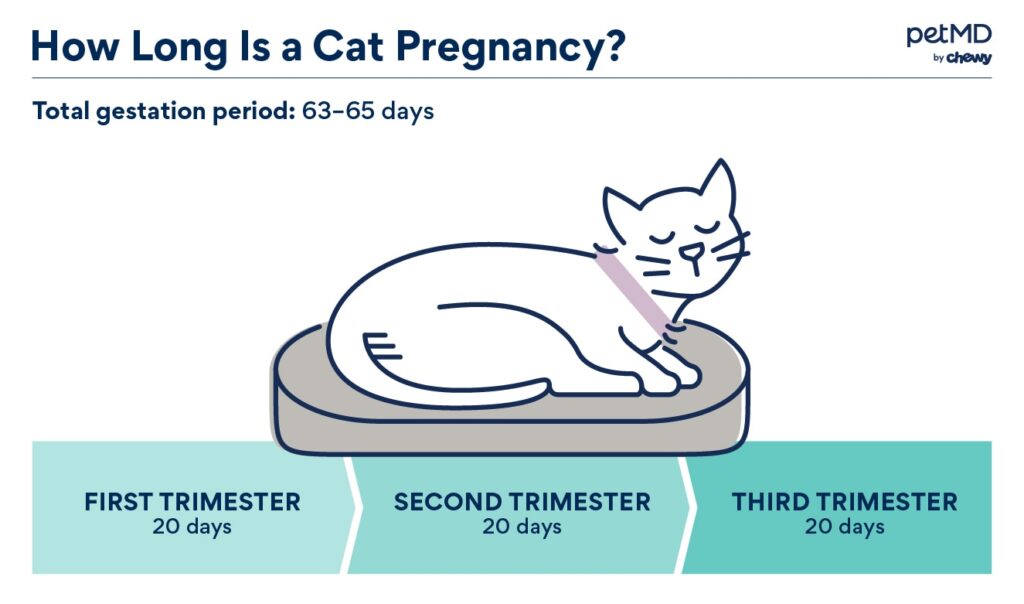
Stages of Cat Pregnancy
Cat pregnancy can be divided into several stages, each with its own unique characteristics and requirements. Understanding these stages will help you support your cat throughout her journey to motherhood.
First Stage: Fertilization and Early Development
In the first stage of cat pregnancy, fertilization occurs and the embryos begin their development. This stage lasts for approximately 15 to 20 days. While the kittens are still in their early developmental phase during this stage, it is crucial to ensure your cat receives proper nutrition and care to support their growth.
Second Stage: Embryo Development
During the second stage, which spans from around day 21 to day 35, the embryos continue to develop and vital organs start to form. This stage requires special attention to nutrition, as your cat’s nutritional needs increase due to the growing kittens. Providing a balanced and high-quality diet will support healthy development.
Third Stage: Fetal Development
From day 36 to day 50, the third stage of cat pregnancy, fetal development, takes place. This is a crucial period where the kittens rapidly gain weight, their fur starts to grow, and they become more active in the womb. It’s important to ensure your cat has ample opportunities for rest and quiet during this stage to promote a stress-free environment for her and the growing kittens.
Final Stage: Preparing for Birth
Around day 58, the final stage of cat pregnancy begins as your cat prepares for birth. Nesting behaviors become more pronounced, and you may notice your cat searching for a suitable place to give birth. Providing a warm, comfortable, and secluded area for her will help create a peaceful environment. Be sure to keep a close eye on your cat as her due date approaches.
Nutrition During Pregnancy
Proper nutrition is crucial for the overall health and well-being of pregnant cats. It supports the growth and development of the kittens and helps the mother maintain her own health. Feeding your cat a balanced and appropriate diet during pregnancy is vital for a successful pregnancy and healthy kittens.
The Importance of a Balanced Diet
During cat pregnancy, it’s crucial to provide a balanced diet that contains all the necessary nutrients. Look for specialized cat food designed for pregnant or nursing cats, as these formulas are formulated to meet the increased nutritional needs of the mother and growing kittens. These foods are often higher in calories, protein, and essential vitamins and minerals.
Feeding Schedule Changes During Pregnancy
As your cat progresses through her pregnancy, you may need to adjust her feeding schedule. Rather than providing one or two large meals per day, it may be more beneficial to divide her daily food intake into several smaller meals. This helps prevent indigestion and allows for better nutrient absorption. Consult with your veterinarian for specific feeding guidelines and to determine the best schedule for your cat.
Recommended Foods for Pregnant Cats
When selecting cat food for a pregnant cat, look for high-quality commercial cat food that is specifically formulated for pregnancy. These foods should contain adequate amounts of high-quality protein, essential fatty acids, vitamins, and minerals. Avoid giving your cat raw or undercooked meat during pregnancy, as it may pose a risk of bacterial contamination.
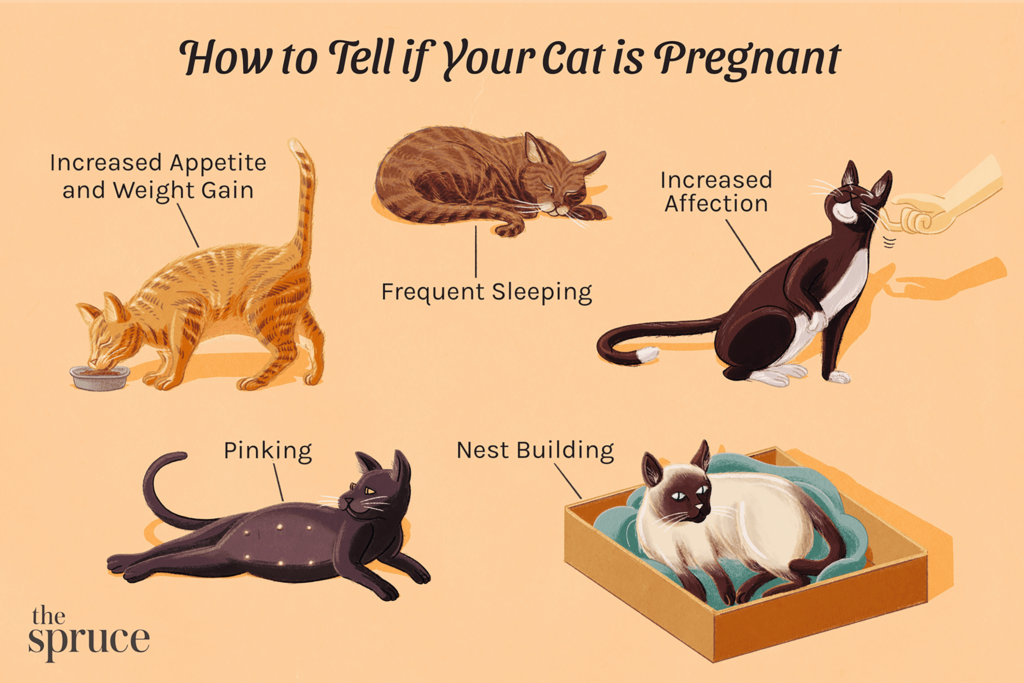
Potential Complications During Pregnancy
While most cat pregnancies progress smoothly, they can occasionally be accompanied by complications that require prompt veterinary attention. By being aware of potential signs of complications, you can ensure the well-being of both the mother and her kittens.
Signs of Complications
Certain signs may indicate potential complications during cat pregnancy. These signs can include a sudden decrease in appetite, lethargy, excessive grooming of the genital area, vaginal discharge, or abnormal behavior. Swelling or redness around the mammary glands can also indicate an issue. If you notice any of these signs or have concerns about your cat’s health, it’s crucial to contact your veterinarian immediately.
When to Call a Vet
If you suspect that your cat is experiencing complications during pregnancy, it’s essential to contact your veterinarian promptly. They will be able to assess the situation, provide necessary medical interventions, and offer guidance on how to best support your cat. Delaying a visit to the vet may put the health of the mother and her kittens at risk.
Possible Medical Interventions
In some cases, medical interventions may be necessary during cat pregnancy. These interventions can include administering medications to address infections or hormonal imbalances, providing additional nutritional support through supplements, or performing a cesarean section if complications arise during the birthing process. Your veterinarian will assess the situation and determine the best course of action.
The Birthing Process in Cats
As the due date approaches, it’s essential to familiarize yourself with the signs of labor and the different stages of the birthing process in cats. This knowledge will help you effectively support your cat during this critical time.
Signs of Labor
Prior to giving birth, your cat may display various signs indicating that labor is imminent. These signs can include restlessness, nesting behavior, increased vocalization, excessive grooming, and a temperature drop below 100°F. Keep a close eye on your cat and her behavior as these signs become more apparent.
Stages of Cat Labor
Cat labor typically occurs in three stages. The first stage is characterized by uterine contractions that prepare the cervix for delivery. This stage can last for several hours and is often marked by restlessness and discomfort in the cat. The second stage involves the active delivery of the kittens, with each newborn arriving within 30 to 60 minutes of intense pushing. The final stage of labor involves the delivery of the placentas. Each kitten is typically accompanied by its placenta, which is vital for the health of both the mother and her kittens.
Possible Complications During Labor
While most cat births proceed without complications, it’s essential to be prepared for potential issues that may arise. Some common complications include prolonged labor, the inability to deliver a kitten, or the presence of a red or green discharge. Any signs of distress, such as a weakened or lethargic kitten, should also be addressed immediately. Always consult with your veterinarian if you suspect any complications during the birthing process.
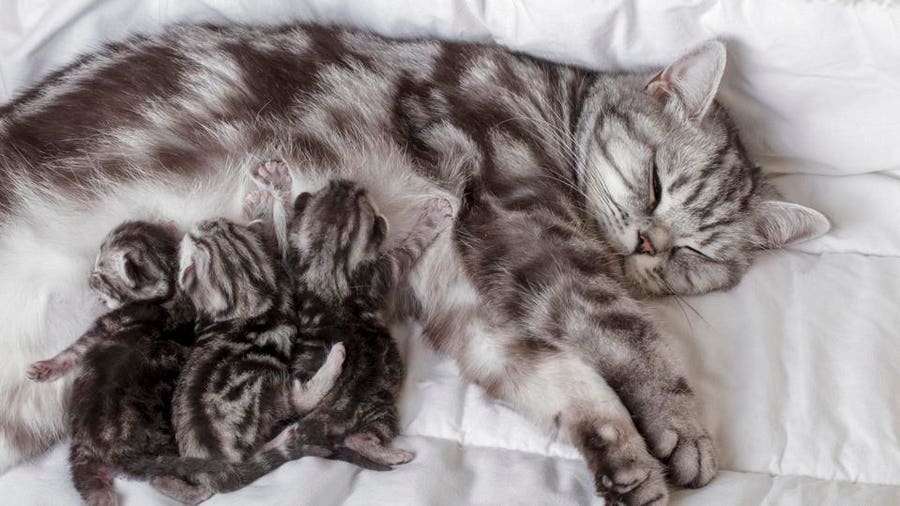
Postpartum Care for Cats
Once the kittens are born, your attention should shift towards caring for the mother. Postpartum care is crucial to ensure her well-being and to minimize potential health risks that can occur after giving birth.
Caring for the Mother After Birth
Providing a calm and quiet environment for the mother and her newborns is essential during the postpartum period. Ensure she has a comfortable and secluded area where she can nurse and bond with her kittens. Additionally, keep the area clean and provide fresh water and easily accessible food for the mother. Be patient and gentle with her, as she may be protective of her newborns.
Potential Postpartum Health Risks
While most cats undergo a smooth postpartum period, certain health risks can arise. Infections of the mammary glands or uterus are common postpartum issues that require prompt veterinary attention. Monitor the mother’s overall health, watch for any signs of discomfort or distress, and seek veterinary care at the first sign of abnormality.
Vet Check-ups Post Delivery
Following birth, it’s vital to schedule a follow-up visit with your veterinarian for the mother cat. This visit allows the vet to assess her overall health, ensure the kittens are thriving, and address any concerns or questions you may have. Regular check-ups post delivery will help ensure the continued well-being of the mother and her kittens.
Caring for Newborn Kittens
Newborn kittens are incredibly delicate and require special care during their early stages of development. By providing appropriate nutrition, health checks, and gentle handling, you can help give them the best start in life.
Feeding the Newborns
Newborn kittens rely solely on their mother’s milk for the first few weeks of their lives. It’s crucial to ensure the mother has a well-balanced diet to provide adequate nutrition for her kittens. Avoid feeding them anything other than their mother’s milk unless advised by your veterinarian. As the kittens grow older and begin to explore solid food, you can gradually introduce a specially formulated kitten food under the guidance of your vet.
Health Checks for Kittens
Regular health checks are vital for newborn kittens. Monitor their weight gain, body temperature, and overall appearance. Healthy kittens should have a steady weight gain, pink skin, and be active and vocal. If you notice any abnormalities or concerns, reach out to your veterinarian for advice and assistance.
Handling Newborn Kittens
When handling newborn kittens, it’s crucial to be gentle and cautious. Their fragile bodies and developing immune systems require careful handling to prevent injury or the spread of infections. Wash your hands before touching the kittens and ensure they are kept in a clean and safe environment. Limit handling to essential tasks and give them plenty of time to bond with their mother.
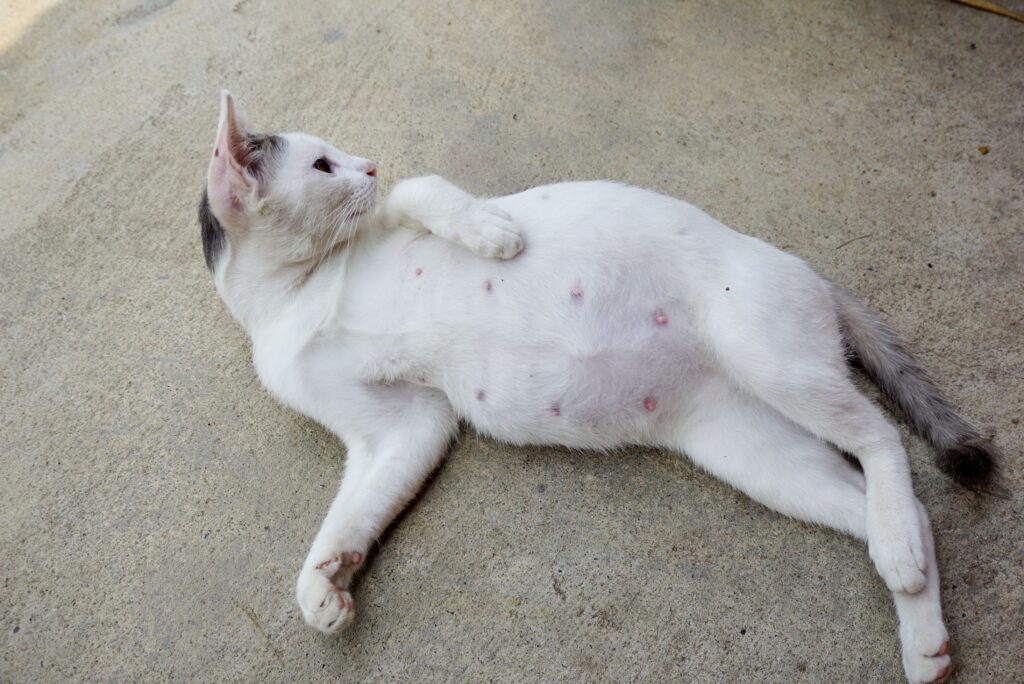
Spaying Cats to Prevent Pregnancy
While cat pregnancy can be a rewarding experience, it’s essential to consider the long-term responsibility and impact it may have on both the cat and the owner. Spaying, or the surgical removal of the ovaries and uterus, is a safe and effective method to prevent unwanted pregnancies.
The Importance of Spaying
Spaying your cat not only prevents unwanted pregnancies but also offers various health benefits. It eliminates the risk of uterine infections and reduces the incidence of mammary gland tumors. Additionally, spaying helps prevent behavioral issues often associated with heat cycles, such as yowling or spraying.
The Ideal Time to Spay Your Cat
The ideal time to spay a cat is typically between four and six months of age. This timeline may vary depending on your veterinarian’s recommendation and the individual cat’s development. It’s important to schedule the spaying procedure before your cat reaches sexual maturity to prevent any accidental pregnancies.
Caring for Your Cat After a Spaying Operation
After the spaying procedure, your cat will require some special care during her recovery. Keep her in a quiet and comfortable area, monitor her incision site for any signs of infection or complications, and prevent her from licking or scratching the incision. Your veterinarian will provide detailed post-operative instructions and schedule a follow-up visit to ensure your cat’s well-being.
FAQs About Cat Pregnancy
As cat pregnancy is a significant event, it’s common for cat owners to have questions and concerns. Here are some frequently asked questions regarding cat pregnancy.
Common Questions About Cat Pregnancy
- How can I tell if my cat is pregnant?
- How long does a cat’s pregnancy last?
- What should I feed my pregnant cat?
- Can I spay my cat while she is pregnant?
- How many kittens can a cat have in one litter?
Debunking Myths About Cat Pregnancy
- My cat can’t get pregnant if she doesn’t go outside.
- My cat needs to have at least one litter before being spayed.
- My cat will know how to take care of her kittens instinctively.
- It’s normal for a cat to have difficulty during labor.
By understanding and addressing these common questions and myths, cat owners can ensure a smoother and more informed experience throughout their cat’s pregnancy journey.
In conclusion, understanding cat pregnancy is essential for providing optimal care for your furry friend. By recognizing the physical and behavioral signs of pregnancy, seeking veterinary care when necessary, and being knowledgeable about each stage of pregnancy, you can support your cat through this remarkable experience. Furthermore, proper nutrition, awareness of potential complications, and postpartum care for both the mother and her kittens play crucial roles in ensuring a successful and healthy pregnancy. Remember, spaying is a responsible choice to prevent future pregnancies and improve your cat’s overall well-being.
